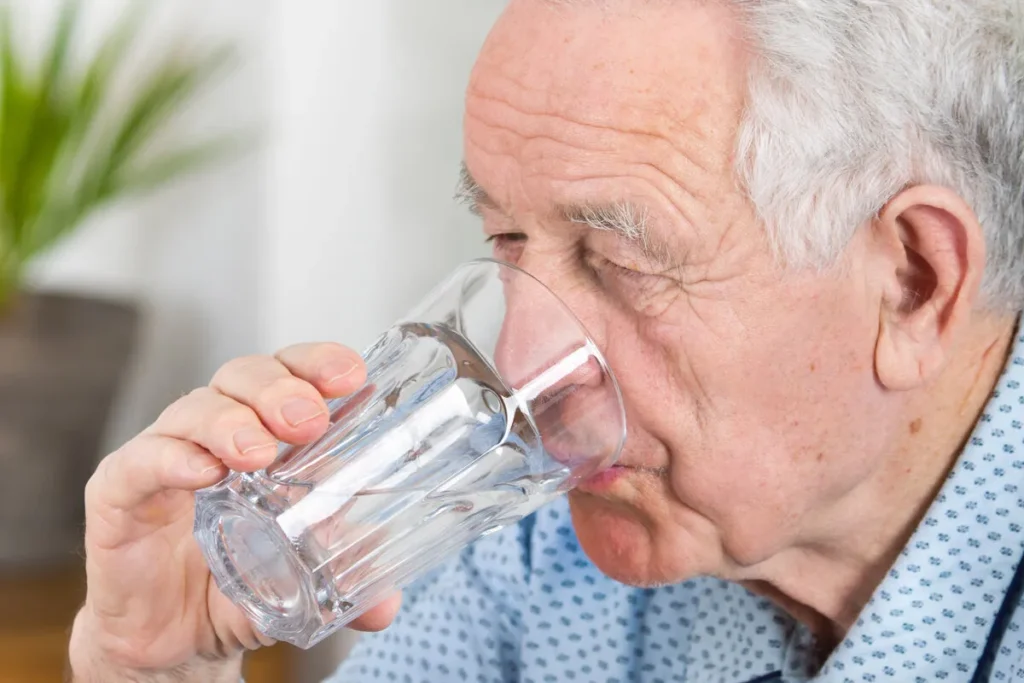Dehydration presents a silent threat to seniors with dementia, creating a dangerous cycle where cognitive impairment increases dehydration risk, and dehydration worsens cognitive symptoms. Studies reveal that 40% of older adults may be chronically underhydrated, with those experiencing dementia facing even higher risks due to neurological changes that disrupt thirst perception and fluid regulation.
The consequences extend beyond temporary discomfort—dehydration is a leading cause of hospitalization among seniors, with nearly half showing dehydration signs upon admission and approximately 50% of those hospitalized dying within one year. Understanding this critical relationship and implementing practical hydration strategies can significantly improve quality of life for dementia patients.
Why Hydration Matters Profoundly for Dementia Patients?

Cognitive Function and Symptom Management
Even mild dehydration (as little as 1-2% body weight loss from fluids) impairs cognitive performance, including attention, executive function, and working memory. For dementia patients, this manifests as accentuated confusion, agitation, and dramatic behavioral changes. Dehydration reduces blood flow and oxygen to the brain, exacerbating existing neurological damage. Research shows dehydrated dementia patients exhibit significantly higher serum osmolality (a key dehydration marker) compared to cognitively healthy peers, confirming a direct biological link between fluid imbalance and cognitive decline.
Physical Health Complications
Urinary and Kidney Issues
Concentrated urine from dehydration irritates the bladder, worsening incontinence and increasing urinary tract infection (UTI) risk—a common hospitalization cause for dementia patients. Chronic dehydration also contributes to kidney stones and renal damage.
Fall Risk
Dehydration causes orthostatic hypotension (sudden blood pressure drops when standing), dizziness, and muscle weakness. This triples fall risk—already elevated in dementia populations.
Medication Efficacy
Dehydration concentrates medications in the bloodstream while impairing metabolic clearance. This dangerously amplifies side effects and reduces therapeutic benefits of common dementia drugs like cholinesterase inhibitors.
The Hydromolecular Hypothesis
Emerging science explains how dehydration may directly accelerate dementia progression. The “hydromolecular hypothesis” proposes that low interstitial fluid volume (fluid between cells) in dehydrated states promotes protein misfolding and aggregation—the same pathological process behind Alzheimer’s beta-amyloid plaques. Essentially, inadequate brain hydration creates an environment where toxic proteins accumulate more readily, causing neuronal damage.
Unique Dehydration Risks in Dementia
Seniors with dementia face interconnected physiological and practical barriers to hydration:
Thirst Perception Failure
Aging diminishes thirst sensitivity, but dementia damages hypothalamic osmoreceptors responsible for detecting fluid imbalance. Patients may feel no thirst despite severe dehydration.
Memory and Executive Function Deficits
Individuals forget to drink, forget how to access drinks (e.g., operating faucets), or abandon drinks mid-task. Caregivers often find multiple full, forgotten cups scattered in homes.
Swallowing Difficulties (Dysphagia)
Up to 80% of advanced dementia patients develop impaired swallowing, causing fear of choking that discourages fluid intake.
Medication Effects
Diuretics (“water pills”), laxatives, and some antidepressants increase fluid loss. Anticholinergic drugs also reduce saliva production, making drinking uncomfortable.
Incontinence Avoidance
Fear of accidents or discomfort from mobility challenges leads to intentional fluid restriction, especially if bathrooms are inaccessible.
Practical Hydration Strategies for Caregivers
Environmental and Presentation Approaches
Visibility and Accessibility
Place colorful, transparent cups (red or blue are highly visible) within constant sightlines. Use lightweight, no-spill cups with angled straws for independent drinking. Ensure water is accessible in multiple rooms via “hydration stations” with small pitchers.
Optimal Drink Selection
Offer diverse options: herbal iced teas, diluted juices, electrolyte-infused waters, or broth. Avoid caffeinated or sugary beverages which increase urine output. Note: Coffee does hydrate but should be limited due to caffeine content.
Innovative Aids
Try Jelly Drops®—95% water sweets designed for dementia patients. Use flavored ice chips or frozen fruit purees for sensory engagement.
Caregiver Techniques and Routines
Scheduled Prompting
Offer 1–2 oz of fluid every 30 minutes—more manageable than large volumes. Use timers or smartphone apps with gentle alarms.
Social Modeling (Mirroring)
Drink alongside the person during chats. Mime drinking motions to trigger imitation—a powerful tool for late-stage dementia.
Activity-Linked Hydration
Pair sips with routines: “Drink with your medication,” “Sip during commercials,” or “Hydrate after each knitting row”.
Hydration Through Food
Incorporate high-water-content foods at every meal:
- Fruits: Watermelon (92% water), strawberries, peaches, oranges
- Vegetables: Cucumbers (96% water), celery, zucchini, tomatoes
- Other: Broth-based soups, smoothies, yogurt, milk-based jellies, ice pops.
Conclusion
Prioritizing hydration is a profoundly impactful yet achievable element of dementia care. By understanding dementia-specific risks—from neurological thirst impairment to swallowing challenges—caregivers can disrupt the dehydration cascade. Simple interventions like scheduled sipping, appealing fluids, and water-rich foods yield outsized benefits: stabilized cognition, reduced infections, fewer falls, and enhanced quality of life.
For persistent challenges, senior living communities or professional caregivers offer expertise through structured hydration protocols and monitoring. Ultimately, each mindful sip represents an act of dignity, preserving connection and comfort throughout dementia’s journey.
In dementia care, hydration isn’t just physiology—it’s a daily ritual of nurturing, a shield against preventable suffering, and a testament to our commitment to honor human dignity even as memory fades.







